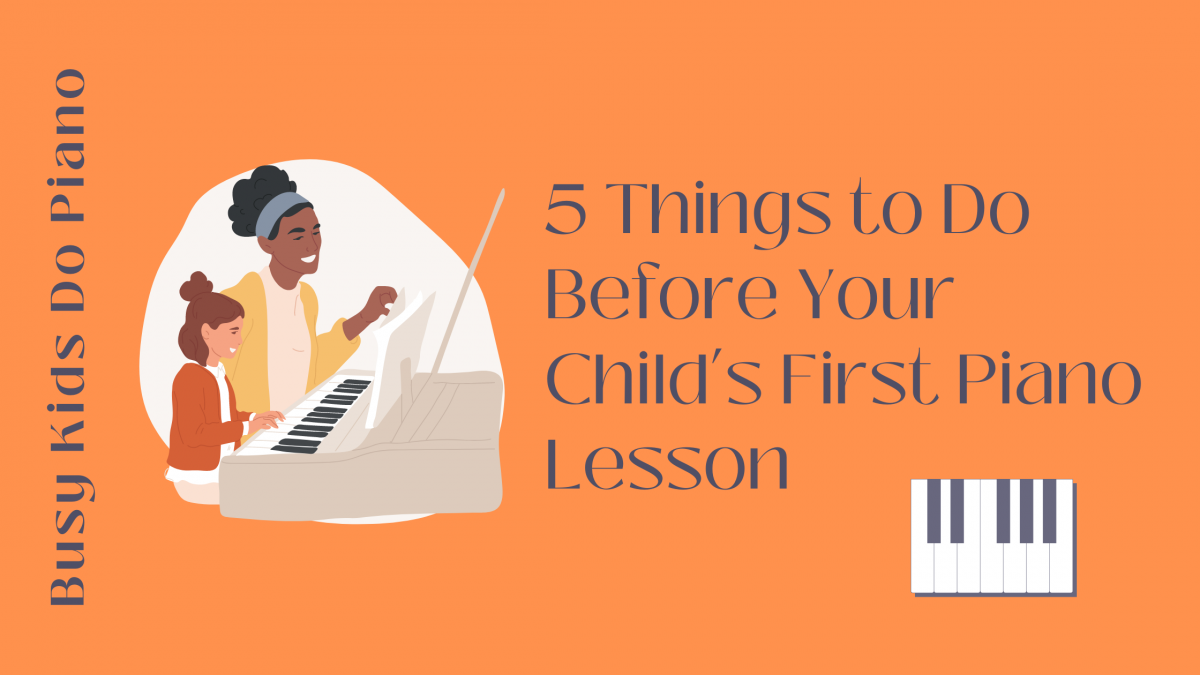You’ve done it! You’ve scheduled your child’s first piano lesson!
Before my daughter’s first day of kindergarten, there were a lot of things we did to prepare. I met her teacher (and tried not to cry as I hounded her with question after question). We went to the store and purchased school supplies and the same Elsa backpack that every other girl in school had. I deposited money into her lunch account and read The Kissing Hand. We did all these things because the first day of school is new and exciting and a bit scary. We wanted her to feel as confident and comfortable as possible in a new environment.
I realize sending your child off to her first piano lesson isn’t quite as big of a deal. However, there are still some things that you can do to help ensure a successful experience — for the first piano lesson and beyond.
Purchase a piano.
Perhaps this one seems really obvious to you. But it’s not unusual for me to have a student show up for his first piano lesson as a parent inquires, “Will he need a piano at home?” I don’t want to take it for granted that you already have an instrument! Which piano to purchase? I’m glad you asked!
 Put the piano in a family-living space.
Put the piano in a family-living space.
While it can be tempting to tuck away a large instrument into a room that doesn’t receive much foot-traffic, your child may not appreciate practicing when he feels as though he is being shut out. Many times, moving the piano from a bedroom to the living room is all a child needs to lessen her resistance to practicing! (Read more about creating a piano practice space in this post.)
Purchase rhythm instruments.
In both my online course for kids and in the classes I teach at my home studio, I utilize rhythm instruments. They help develop rhythm and accompaniment skills – and students love them. It helps them to focus solely on the timing of a piece instead of being distracted by all 88 keys on the piano. My favorites to use are gathering drums, but I also have triangles, tambourines, wood blocks and bells.
Even if your teacher doesn’t include any rhythm work separate from the piano, you can assist your child at home. Practice the the rhythm of his piano pieces using one of these fun instruments.
Discuss your expectations with your child.
Unlike a seasonal sport, piano lessons are not something your child will do for a few months. Learning to play a musical instrument is an ongoing commitment and involves work! While that can be intimidating, it’s also one of the things I love about having my own children in music lessons. Students learn that there is not instant perfection and that you must practice in order to progress. But you MUST have this conversation with your child before lessons, so that she understands what this looks like.
Are you committing to lessons for a year? Are you committing for the entirety of grade school? Or maybe you’re just trying it for a semester to see how it goes? Have this conversation up front so that if — six months in — your child is begging you to quit, you can point back to your original discussion about long-term expectations. You can help her work through her frustrations rather than engaging in a debate about continuing lessons.
Set aside practice time.
Our schedules aren’t the same every day. But I have found that when it comes to my own children learning instruments, having roughly the same time period set aside each day to practice ensures that we actually DO practice. Many of my most successful students have also built practice time into their regular routine. Before your first lesson, talk with your child about how there will need to be daily practice time dedicated to learning an instrument. See if you can work together to “pencil it in”.
Some of my students get up 15 minutes earlier in the morning to practice. Others practice right after school or following dinner. At our house, we actually do it before bed, so my husband is home and can entertain the child who isn’t practicing!
While your practice time may change as you figure out what works for your family, it is important to talk to your child about what practicing looks like. Reassure your student that you will be her practice partner along the way.
The bottom line is that creating an open dialogue about what learning an instrument entails is important. Do it before the first piano lesson! You are also showing your child your excitement and support from the get-go in how you dedicate space and time in your schedule and home for practice.
Doing all this sets the stage for a music lesson experience that can be approached relationally and with joy.
I’m so excited for you and your child to be embarking upon what I hope will become a lifelong love of creating music!



